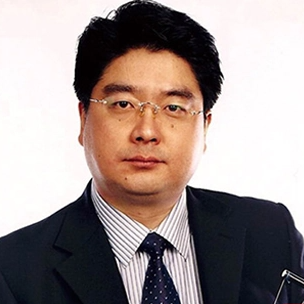Cao Dewei
Organized by 沈梦溪 on 2022-02-09
 Cao Dewei, born in Tianjin in 1963, is a famous erhu performer and director of the String Teaching and Research Section of the Chinese Music Department of the China Conservatory of Music.
Cao Dewei, born in Tianjin in 1963, is a famous erhu performer and director of the String Teaching and Research Section of the Chinese Music Department of the China Conservatory of Music.In 1987, he won the first prize of the first "Jiangnan Silk and Bamboo Competition at home and abroad". Published papers "On Erhu's Kneading Techniques", "My Views on Erhu Bowing" - Talking about the playing technique of "Jiangheshui", "Two Principles of Erhu Playing Skills", "Six Theories on Erhu Teaching", "On the Pronunciation and Tone", "On the Scientific and Systematization of Erhu Teaching", "Don't Say I Prefer Erhu", "Multi-perspective Analysis of the Research Status of "The Great Wall", etc.
It has trained a large number of postgraduates, undergraduates and professional performance talents for major art colleges and performance groups across the country, as well as at home and abroad. He has successively visited the United States, Germany, France, the Netherlands, Belgium, Luxembourg, Switzerland, Sweden, Portugal, New Zealand, Japan, China Hong Kong, China Macau and other countries and regions. His performances have been well received by musicians and audiences from all over the world, and he has toured six countries including Vienna, Austria, Italy and Egypt. With the China Broadcasting Chinese Orchestra, he performed as the Jinghu soloist on the domestic tour, and received great acclaim.
Cao Dewei has successively learned bowed and stringed instruments such as Erhu, Gaohu, Banhu, Zhonghu, Erxian, Yehu and Jinghu under the tutelage of famous Huqin master Liu Mingyuan, educator An Ruli, and famous Peking Opera pianist Zhang Suying. His playing style is delicate and euphemistic, with beautiful timbre and skillful skills, coupled with a deep understanding of music and a rigorous "academic" style, he has achieved the perfect unity of rationality and passion.
Similar artist
Xiong Qi, Director of the Instrumental Music Teaching and Research Section of the Conservatory of Music of Changsha University, young backbone teacher of ordinary colleges and universities in Hunan Province, double qualified teacher, and national first-class performer; President of Huqin Professional Committee of Hunan Ethnic Orchestra Association.
read >>
Xianyin Erhu is an Erhu master, professional performer and educator. He has his own channel account at station B and has 11,000 fans.
read >>
Huo Xiaojun was born in Tianjin and is a national first-class performer. She began to study erhu at the age of 8. Due to her outstanding performance, she successfully entered the China Opera and Dance Theatre after graduating from university. In 2001, she was invited to join the "Twelve Girls Band" and became "the only member of the group who did not sign a contract". .
read >>
Lu Yiwen, a Chinese erhu player, a young erhu teacher at the Shanghai Conservatory of Music, a director of the Erhu Society of the Chinese National Orchestra Society, and the winner of the Golden Bell Award, the highest award of Chinese music, and the Wenhua Award.
read >>
Qi Jianda, male, born in 1954. Jiangsu Nanjing native, Han nationality, erhu performer, educator, national first-class actor.
read >>
Involving musical instruments
Erhu (Pinyin: Erhu) originated in the Tang Dynasty, called "Xiqin", and has a history of more than a thousand years. It is a traditional Chinese stringed instrument. Erhu, or Erxian Huqin, also known as "Nanhu" and "Omzi", is one of the main bowed and stringed instruments (wiping strings) in the Chinese national musical instrument family.
Involved portfolio
华夫饼 - 143 views
愛 - 103 views
关谷奇迹 - 111 views
南丘 - 58 views
赵锦辛 - 68 views
Involved news
Organized by 尼禄 on 2025-02-27
In the 1970s, Mr. Liu Changfu, a master of the erhu, created a piece of music with a Mongolian flavor, "New Herdsmen on the Grassland", through his unique artistic perspective and profound cultural background. This composition not only depicts the magnificent scenery of the Inner Mongolia grassland but also sings the praises of the rich and colorful lives of the younger generation of herdsmen and their optimistic and cheerful spirits.
read >>
Organized by 象牙山首富 on 2025-02-14
"Early Spring in Miao Mountain" is a vibrant and dynamic erhu masterpiece that vividly portrays the life scenes and natural landscapes of the Miao people in southwestern China through its unique musical language. This piece not only showcases the rich expressiveness of the erhu, a traditional Chinese instrument, but also conveys the breath of spring and the rhythm of life through its notes.
read >>
Organized by 夜夜 on 2025-01-02
As an indispensable member of Chinese folk music, Erhu is deeply loved by musicians for its unique timbre and expressive force. However, because its structural materials are mainly natural materials such as wood and python skin, it is more sensitive to environmental changes, especially in the winter when the temperature drops sharply and the air is dry.
read >>
Organized by 汤圆 on 2024-12-06
In the treasure house of Chinese traditional music, "Candle Shadow Shaking Red" occupies a place with its unique charm. This piece of music was originally a Song Dynasty song card, later adapted into a variety of musical instrument version, especially the Erhu performance is the most well-known.
read >>
Organized by 一杯清酒 on 2024-12-03
Sanmenxia Rhapsodies is a solo Erhu composed by the famous composer Mr. Liu Wenjin in 1962. This work is not only a classic in Chinese folk music, but also an important milestone in the development of modern erhu performance technology. It takes the famous water conservancy project on the Yellow River - Sanmenxia as the background, through the form of music to show the indomitable spirit of the Chinese nation and the yearning for a better future.
read >>
Popular artists
- 01 Zhang Xiuyan
- 02 Jiang Ying
- 03 Li Zhen
- 04 Liu Qingyao
- 05 Lin Hai
 渝公网安备 50010702504639号
渝公网安备 50010702504639号